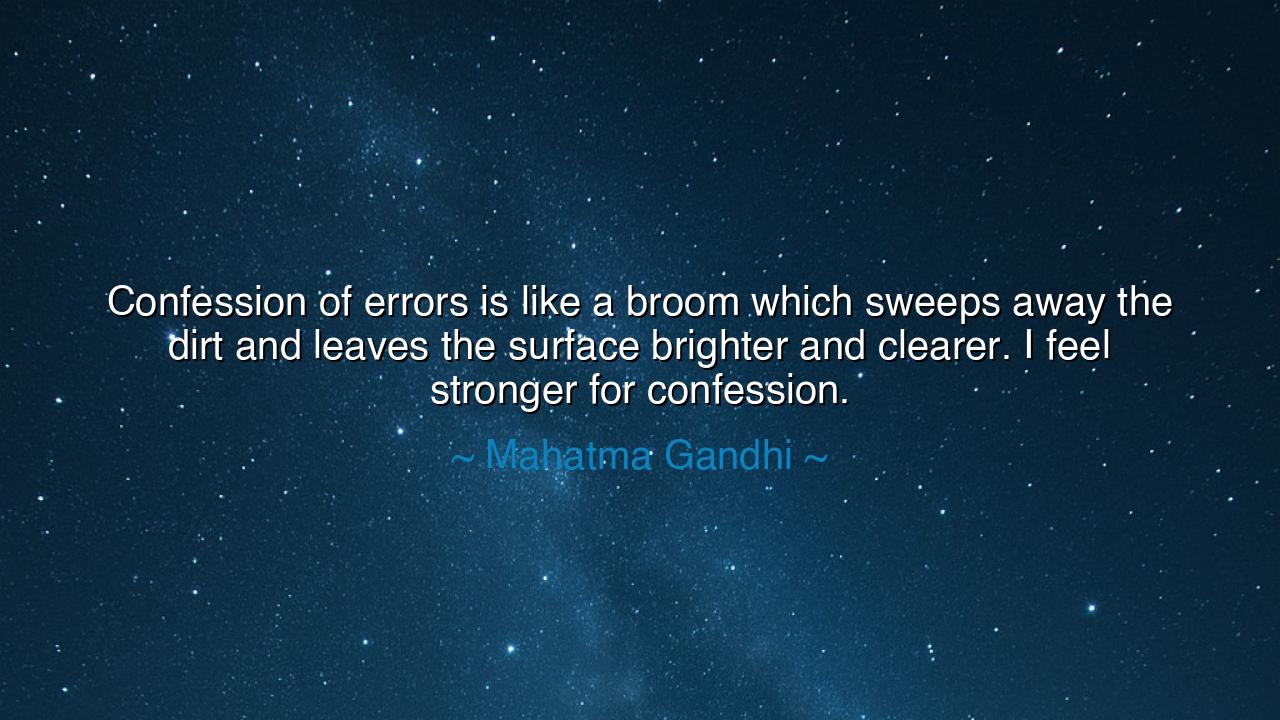
Confession of errors is like a broom which sweeps away the dirt
Confession of errors is like a broom which sweeps away the dirt and leaves the surface brighter and clearer. I feel stronger for confession.






Mahatma Gandhi, the apostle of truth, once spoke these words of deep humility and power: “Confession of errors is like a broom which sweeps away the dirt and leaves the surface brighter and clearer. I feel stronger for confession.” In this saying is revealed a wisdom both simple and profound. For the human soul, like a dwelling, gathers dust and dirt in its hidden corners. Pride conceals these stains, but confession uncovers them, sweeping them away, leaving the heart purified, cleansed, and renewed. It is not in denial of fault that one grows strong, but in the courage to admit and to correct.
The ancients also knew this truth. Socrates, though famed for wisdom, proclaimed, “I know that I know nothing.” His greatness lay not in claiming perfection but in confessing ignorance, for in confession lay the doorway to deeper truth. Likewise, the prophets and saints of many traditions taught that the first step toward righteousness is repentance, the open acknowledgment of one’s errors. To confess is to bow low, yet in bowing one rises taller than before, for one has cast off the burden of deception.
Gandhi himself lived by this principle. He was not ashamed to admit when he had erred, whether in judgment, in word, or in action. He recorded his own shortcomings in his Autobiography, not to diminish himself but to demonstrate that truth is greater than pride. Once, after realizing that his harshness had hurt others during his campaigns of nonviolent protest, he openly confessed his error before his followers. This did not weaken his leadership—it strengthened it. For the people saw that he was a man of integrity, willing to sweep his soul clean before them. In this way, confession became strength, not weakness.
To hide one’s mistakes is like hiding dirt beneath a rug. It remains, festering, polluting the air of the spirit. But to confess is to bring it to light, to cleanse it, to restore clarity. The one who refuses confession becomes brittle, weighed down by lies and pretense. But the one who confesses becomes supple, light, and free. It is the paradox of life: by admitting weakness, one grows strong; by acknowledging error, one becomes wiser.
History gives us also the tale of Abraham Lincoln. When he erred in judgment, he often confessed it openly. After a disastrous military decision during the Civil War, he took full responsibility rather than casting blame. His honesty, his willingness to admit fault, did not diminish the people’s trust—it magnified it. They saw in him not a flawless man, but a true man. And from that truth arose a strength that carried a nation through its darkest trial.
To feel stronger for confession is to taste the liberation of the soul. For pride imprisons, but humility sets free. The heart that confesses no longer fears exposure, no longer wastes energy in defense of its illusions. Instead, it can turn fully to the work of growth, of healing, of serving others. A confessed fault is already half-healed; a hidden fault festers like a wound left untended. Thus, confession is not merely cleansing—it is empowering.
The lesson is clear: do not fear confession. Do not imagine it to be shameful. To confess your errors is to sweep your soul with the broom of truth, leaving it brighter and clearer for the days ahead. It is a discipline not of weakness, but of courage. For the proud may seem strong for a moment, but the humble endure in strength forever.
Practical action follows: When you err, admit it quickly—first to yourself, then to others if they are wronged. Let your words be sincere and without excuse. Write your faults in a journal and learn from them, rather than hiding them away in silence. Teach your children and companions by example that confession is not disgrace but honor. In this way, you too will feel what Gandhi felt: a strength born from humility, a clarity born from truth, and a freedom born from confession.






AAdministratorAdministrator
Welcome, honored guests. Please leave a comment, we will respond soon